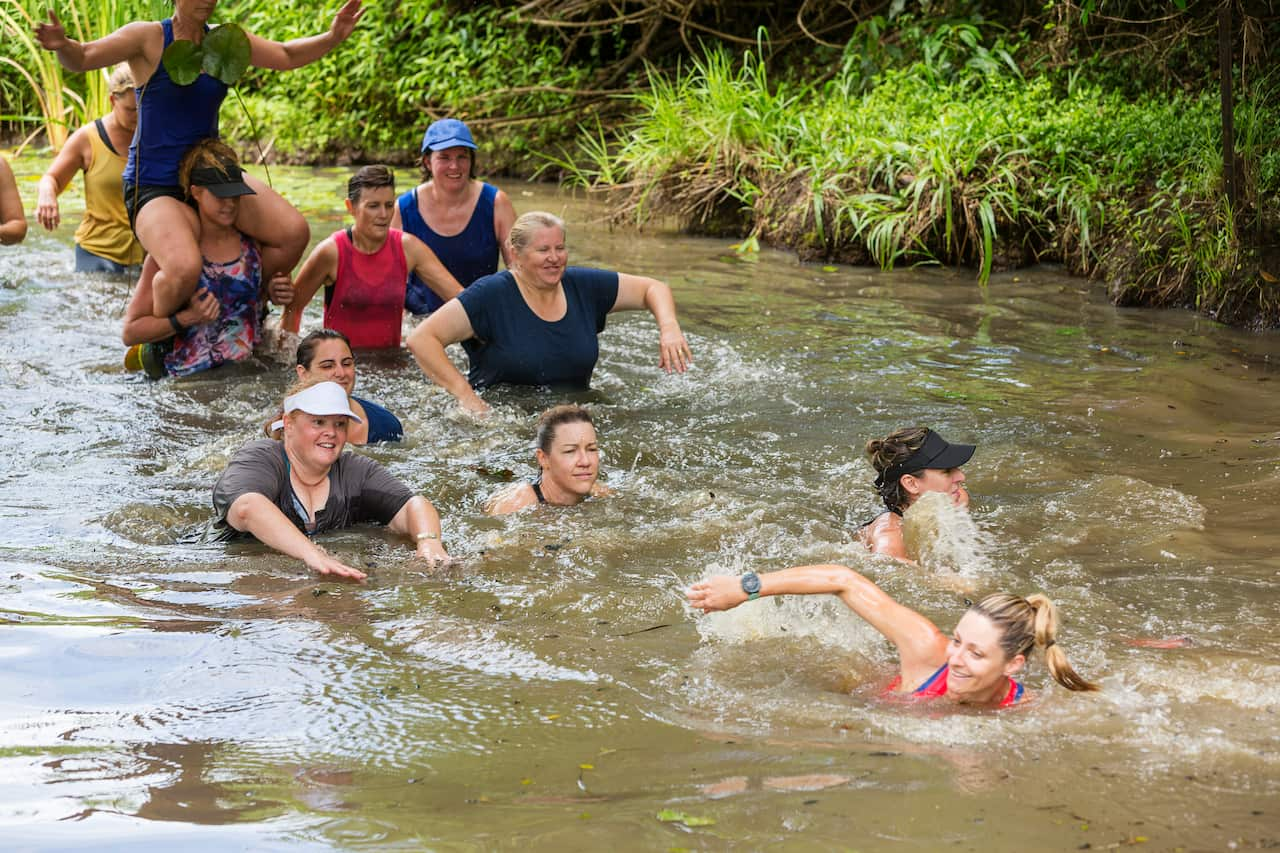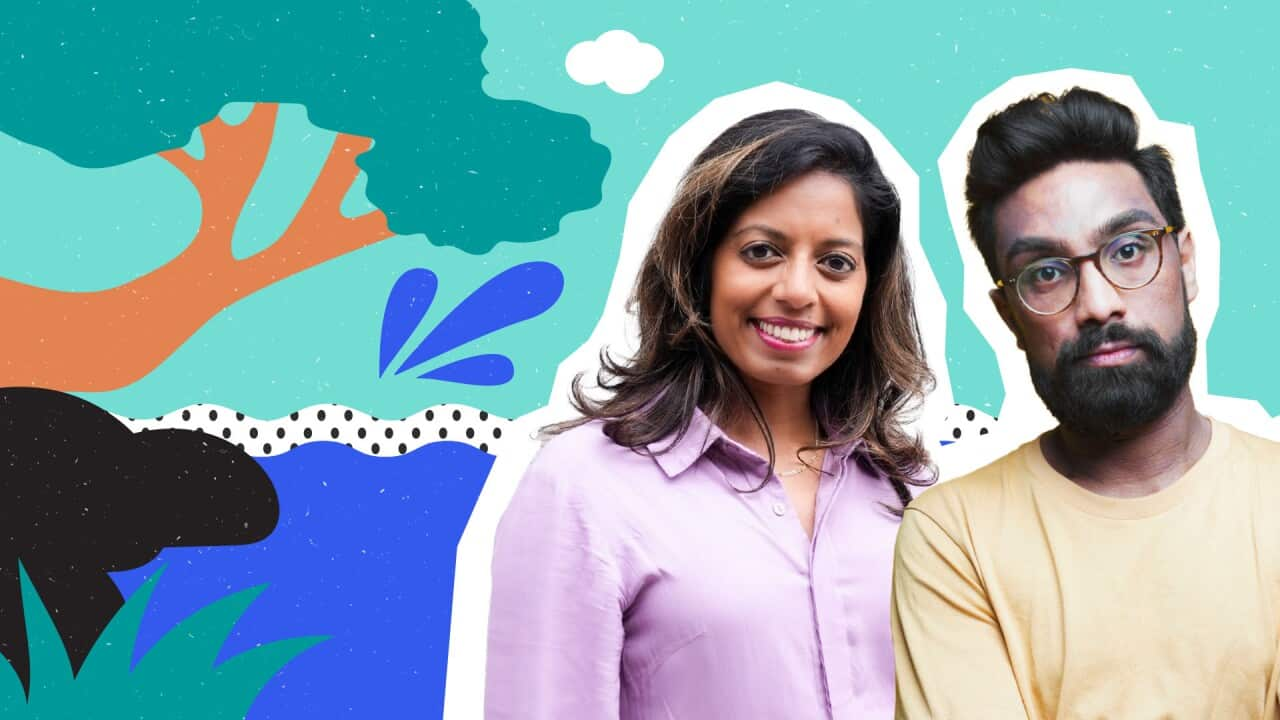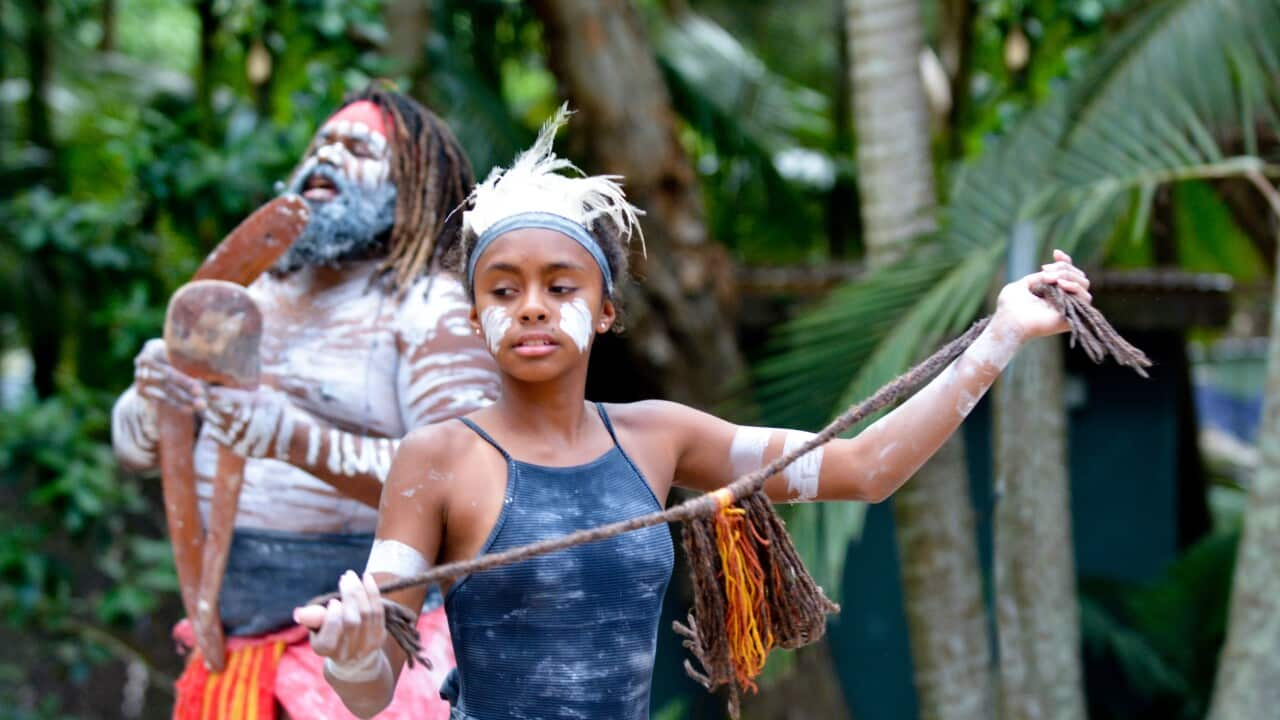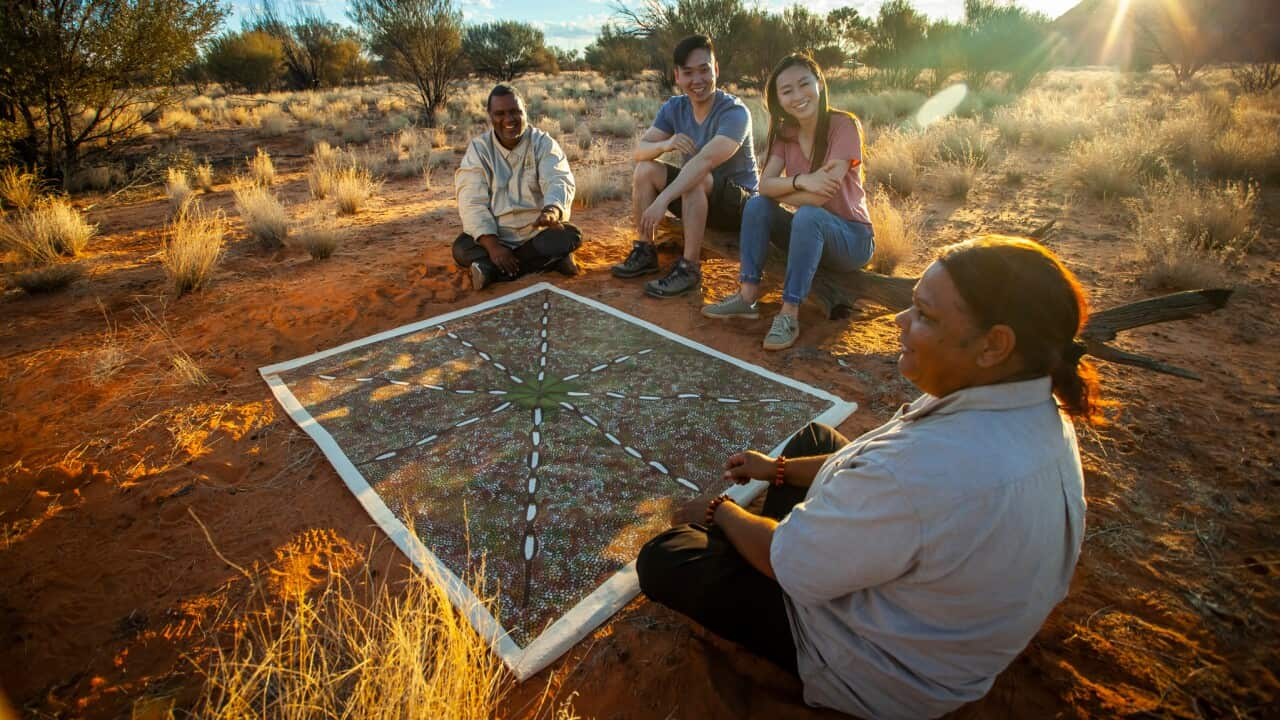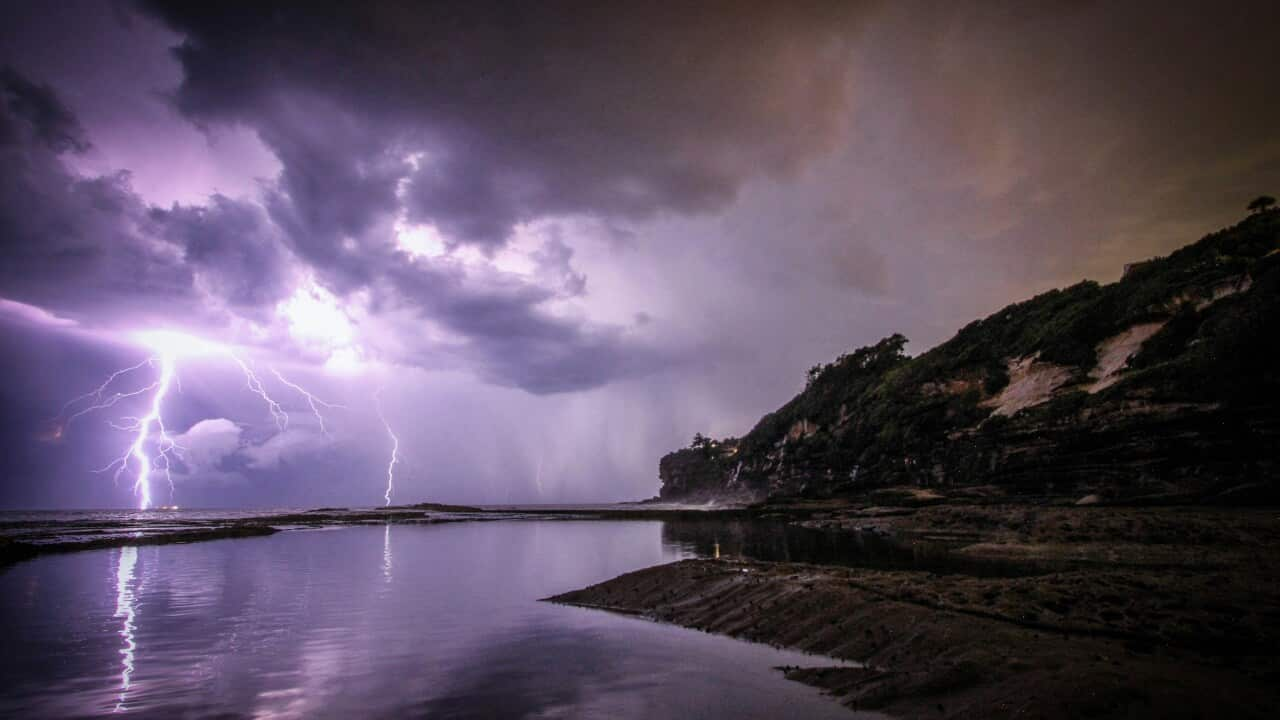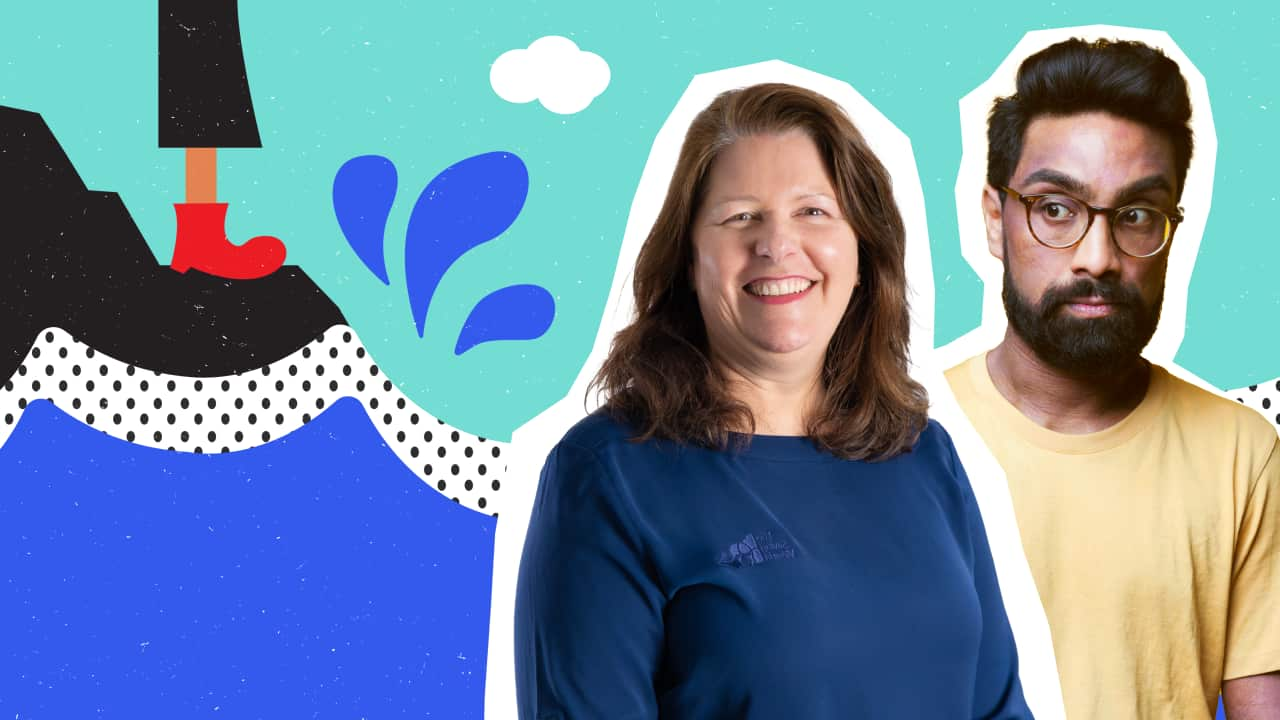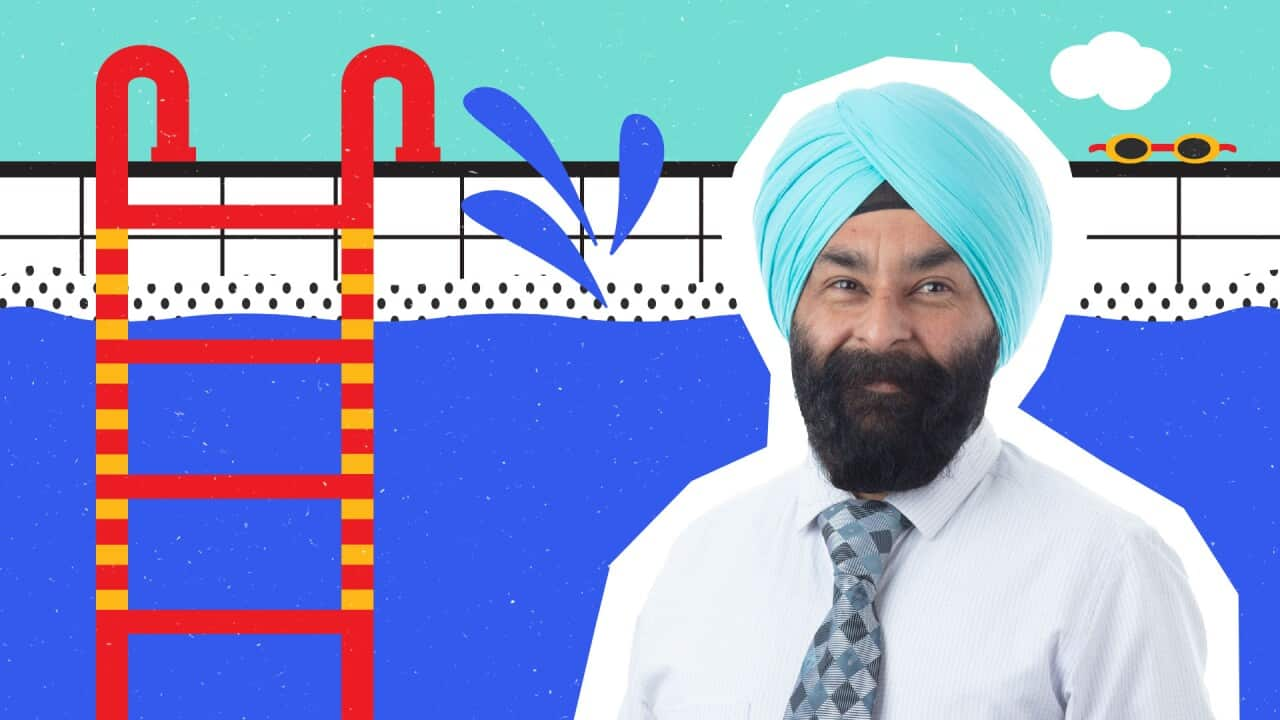Presenter 1
We'd like to acknowledge the Traditional Owners of the land we're recording from. We pay our respects to the Wurundjeri Woi Wurrung people of the Kulin Nation and their Elders, past and present. We also acknowledge the Traditional Owners from all Aboriginal and Torres Strait Islander lands you're listening from.
spk_1
I learned to swim in different ways, so it would be, you know, out with my family, water skiing at the weir, so I'd, you know, I'd learnt to swim. I always had life jackets on, right? Yeah, swimming in the river and swimming at the pool, like every weekend with my brother.
spk_1
A beautiful waterway in the Northern Territory, and it was at Mataranka, it's a hot springs, just magical. Yeah, just magical. And I remember going underwater with my big brother. She's the Indigenous lead at SBS and she's swum all over Australia.
spk_1
Beaches, Surfers Paradise Beach, I've swum there, dams growing up, yeah, they were swimming in dams in that murky water, I remember, the same water you'd get yabbies in as well as kids. Yeah, the river again, and, and just swimming pools, you know, whether it be the public pool, which was always really fun, cos that's where you got together with your friends, it was like the place to be.
spk_0
Hey, I'm Suren Jayemanne, and I'm Sashi Perera. This is Head Above Water, where you're invited to join me as I learn all about Australia's incredible water culture,
spk_2
and how to stay safe in all kinds of water environments.
spk_0
So far we've been to the beach, the pool, on a boat, and even out on the rocks for some rock fishing. My last stop on this water adventure is inland waterways.
spk_2
First, we'll talk to Kerri-Lee Barry about some of the different freshwater environments you'll find across Australia. Then you'll meet James Brincat. He's a park ranger, which means a big part of his job is keeping people safe when they're visiting inland waterways.
spk_1
Hello, I'm Kerri-Lee, and I'm the Indigenous lead at ALC, which is Audio and Language Content at SBS Audio.
spk_0
During this podcast I've been learning all about Australian water culture and water safety. It started at the beach for me. Are you much of a beach person?
spk_1
I love a little bit of the water, but I don't go out past my knees. But the beach, yeah, bring it on, your palm trees, coconuts.
spk_2
I was born in Sri Lanka and I feel like culturally for us it was very much the knees rule as well. It's just you, you do not go past.
spk_1
Is that right? Is that what your old people would say?
spk_2
Uh, the Elders would very much just say it's the safest place to be and they would get very, very intensely stressed if you tried to go past that, yeah.
spk_2
Australia's waterways can be very special and spiritual for Indigenous communities. What does the water here mean to you?
spk_1
The water in Australia, to me it's magical.
spk_1
It's a really special place, depending on which waterway you're at, on which Traditional Country, and what it means spiritually and what it means to the people who live on that land as Traditional Owners, it's their magical place, yeah, and it's their um their spiritual stories, yeah, are within the land and the waterways.
spk_1
We've got so many groups across Australia, I'd be here, you know, for a couple of days telling you about all the waterways with our groups, so you need to hear from the people from that land about what that waterway means to them.
spk_2
Given that they are really special places that of significance that we're swimming in, what should we keep in mind in terms of respecting the land?
spk_1
Well, you just said it there, it's the word respect. That's number one, just have respect, yeah. That um you, you know, you might just turn up and see, see a lake or a river in front of you.
spk_1
And just go, yeah, it's just water.
spk_1
Aboriginal and Torres Strait Islander people don't look at it like that, yeah? We look at it in a holistic sense.
spk_1
Me and water, yeah, we, we go back a long way, and um I have a great relationship with water, you know, we need it to survive, right, all of us on this planet.
spk_3
Hi, my name's James Brincat. I'm the area chief ranger for Werribee Plains, and for those who don't know, it's in Victoria, and Werribee River runs right through the center of where I manage. It's not as heavenly as you'd think being a park ranger. A lot of it is spent doing admin, but there is a very, very attractive side to our jobs, and that is we, we are outside.
spk_3
For when we have to look at what we're managing, we're not inside a factory. We are very much governed by the weather, and for those of us that manage parks that have water bodies in them, part of our day to day management is about managing the water and what comes with it.
spk_3
So there is the water quality aspect, so at our end, we're at the, just before it meets the sea, so just about everything we do around that river can impact on what ends up in the bay. So we're very conscious of that and the way we go about our work, but there's also a thing called safety, and when you've got lots of park visitors, and especially in a garden.
spk_3
A garden can give you a sense of safety just by being in it, so you may not be aware of the risks when you come into contact with a water body, and part of my job is to ensure that whatever we have, whether it's pathways leading to the river, whether it's signage, whether it's our design in how that pathway hits the river, these are very, very important aspects about my job.
spk_0
I know that you meet with community groups to talk about water water safety as part of your work. You have a favourite way of starting the conversation. I'd love to hear from you. What's the question you ask those groups when you first meet?
spk_3
When I meet with other cultural groups, especially those who come from the Middle East, one of the first questions I do ask is if they can guess where I come from.
spk_0
When you're meeting with a new group, a new community, why is it that you want them to guess your nationality?
spk_3
I think it sits in all of us, where there is somebody that is really foreign telling you what to do is different from where you've made some sort of connection.
spk_3
And I think, you know, especially when I'm presenting to Middle Eastern and Mediterranean, I think having that connection makes a difference.
spk_3
In that it's not an automatic credibility, but you're close.
spk_0
I may be cheating cos I'm looking at the sheep, but I'm gonna guess Malta. Yes, yes, correct, cool. And so that you grew up in Malta, is that correct?
spk_3
No, I grew up in, in Australia and my parents were from the generation post-war, post World War II arrivals. Very, very interesting background as far as they grew up in the city, but surrounded by water.
spk_3
Are learning to swim like most or all Maltese, um, by the time they are 4 or 5, they are swimming, um, and that certainly isn't the way you would describe me as a child, because I did not learn to swim until I was in my early teens.
spk_3
I nearly drowned as a kid.
spk_3
And when I was growing up, I was friends with another kid from a different part of the world, and he was witness to a drowning of a close friend of his and tried to save his friend.
spk_3
That really sort of sat with me about that, this fear of water, it actually made it worse.
spk_3
So I did not want to learn how to swim, which worried my parents from coming from a background where being able to swim is not only part of life, but it's one of the most important parts of your life because you never know when you're going to end up in the water, because you are surrounded by it.
spk_0
I actually have an experience where I was in Malta one year and I'm not a swimmer myself, but we were at, I think it's Blue Lagoon or or in Comino, one of the lagoons there, and my friends wanted to dive off the rocks and it didn't look far to me, but as soon as we got into the water I was like I don't think I should be swimming. My friend had to carry me on his back to the other side.
spk_3
You know what, that's a wise decision because if there's one thing about Malta that will jump out, there's very few sand beaches. So when you're in the drink.
spk_3
You are above your head immediately. There is no gradual entry into that water, and that makes a big difference, and that was probably one of the wisest decisions you made, because if you're not a good swimmer, you shouldn't be jumping off rocks anyway, when you cannot see the bottom, or, or where the bottom is. What you think is very deep may not be deep, and what you think is shallow certainly may not be shallow.
spk_3
And it's the one thing in your mind about the dangers of water and what sits underneath it.
spk_3
Even a large dam can be, again, what you think is safe, but that mud, you can sink like a shot and you can't get out, and it's also freezing cold.
spk_3
Often when we were growing up, they used to tell us never jump into a dam.
spk_3
I don't know about the truth of the heart attack business that it can cause, but it look, having a property with dams, and I swim in them now as adults, they're very small dams. Always take a floating device with me, but they are cold.
spk_3
They are super cold.
spk_2
Suren, you and I both live in Melbourne where it can get really cold. Do you reckon that is something that's stopped you from swimming in the past?
spk_0
Totally, like I understand people go to the beach when it's like 30+ degrees because they want to cool off, but I can never understand those people who swim through the winter, like people at St Kilda Pier in South Melbourne Beach, it's like, that seems crazy.
spk_2
Yeah, I mean, to be fair, for me, I feel really cold in the water here, like, genetically I'm supposed to be at the equator in Sri Lanka, you know, and I feel like the water there is so much warmer, it's like bathwater over there, and then when we moved here to Perth, the water, I found the water really cold but the weather in Perth was really warm, so it was fine. And then moving over to Melbourne, it is freezing.
spk_2
And yeah, I don't know, I thought maybe it'd be different, but you were born here and you still find it cold.
spk_0
Yeah, I mean you can tell just when you turn the tap on, it's like I can't imagine diving into that.
spk_2
No, no, I can barely put my hands in there. But a real game changer for me because my husband was born here was when he bought me a wetsuit.
spk_2
I thought wetsuits were only for surfers, but that has really helped extend the amount of time I can spend in water here. Yeah, wow, that's pretty cool. It is cool, but I thought I was just being a whinger, like why is James talking about the temperature so much? Is it actually a big deal?
spk_0
Well, it turns out, Sashi, yes, it can be.
spk_3
There's a thing called hypothermia, OK, so if you fall from a boat into cold water and our bay is cold enough in winter, and you sit out there, and you can't get back into your boat, so if you're on your own in a boat, and you haven't been taught how to get into a boat, and all that time you're spending in that water trying to tread water, trying to grab gear.
spk_3
All that stuff is taking a toll on your energy levels, your heat levels, and exhaustion happens super quick in comparison to just standing outside. So cold is, is deathly, it really is.
spk_0
What are the things, the most important things that people should be considering when they're going to these kinds of places?
spk_3
My advice is never get into the water unless you can swim.
spk_3
You don't purposely go in.
spk_3
Right, no matter what your mates are saying.
spk_3
And you can have a great time in water.
spk_3
And coming from a person that had a deep fear of it, you know, I love going out to swim, especially in natural areas. I'm not a fan of waves, no. I leave that for the surfies, OK, but I am a fan of lakes and I am a fan of gorges and billabongs and swimming in them. So they are really, really enjoyable places to be. But, you know, it, it's, as I said, they, just about everything's got a risk. It's great going for a drive, but being on the road has a risk.
spk_3
OK, and you can drive really beautiful roads, and if you think about the most beautiful roads you've ever, they're always curvy, right? And they're always surrounded by, you know, amazing views or peeps into views and the Great Ocean Road being the, you know, the biggest example. OK. That's not to say you should never go out on a road, OK, but you, you need to have your lines of defense, and knowing how to swim would be your biggest one, and not swimming alone.
spk_3
OK, so especially in inland bodies, but when you're with your mates, you keep your eye on your mates, right? You look at our parents and, um, I'd never know whether this is the truth or not, but our parents wouldn't let us go in the water an hour after eating. OK, there's all these rules about eating. Well, can I tell you, you shouldn't go anywhere near the water if you've been drinking, right, and I absolutely, you know, I could not stress that, you need to have all your wits about you when you're in water.
spk_3
And when you've got that, you'll really enjoy yourself, right, because the risk, most of that risk is now gone.
spk_0
I don't have kids myself, but I, I am thinking
spk_0
about if I was to have a family and my, my son was not a confident swimmer, or my daughter was not a confident swimmer, but they were going on a trip with friends, I understand that temptation might be there because their friends are all jumping in the water, they might feel like just to fit in, they wanna get in. Do you have any advice for people in that situation?
spk_3
Well, think about when you were growing up, I don't have kids either, so I wouldn't know the first thing about parenting, right? Think about when you were growing up, cos I know a lot about being a teenager, cos all the trouble I've ever gotten into was when I was a teenager.
spk_3
You would dress the weirdest you've ever dressed because your mates were dressed like that. You would probably speak the weirdest form of English you've ever done, because that was what your mates did, and people that we aspire to be.
spk_3
Can often as a teenager give us a command and we don't realise it's a command, so, you know, I bet you couldn't jump in the water and swim over to that rock, is enough sometimes for teenagers to go, I'm going to do it, or even people who are younger.
spk_3
So I would tell people, OK.
spk_3
If you don't think it's safe, if you're nervous about it, don't do it, right, fair dinkum. And look, I learnt growing up, sometimes it's better to say I, I could not get in that water, mate, for all the love in, in the world, I could not get in that water. And for some reason you get the respect out of it, right? But it's very tempting to do what kids, other kids tell their kids to do. It's tempting for them. If you could only
spk_0
remember three things, the key 3 takeaways that you would, you would say are important for someone who's gonna go swim in a lake or gonna go, to one of these freshwater bodies of water, what, what are the key three takeaways?
spk_3
Ah, based on my experience and growing up, learn how to swim first before you get into water, right, full stop.
spk_3
Still water, you should have a flotation device with you, right, even a yoga mat, right, you can sit on, like you'd be surprised what's sitting around and never get into moving water unless you really know what you're doing.
spk_3
That's James Brincat, a park ranger with Parks Victoria.
spk_2
And before that you heard Kerri-Lee Barry, the Indigenous Lead for Audio and Language Content at SBS Audio.
spk_2
Suren, you've done it. You've learnt all of the essentials of water safety. We've visited the beach, the pool, we've been on a boat, gone rock fishing, and now we've learnt about how to keep safe in Australia's rivers, creeks, and rock pools. What are your takeaways?
spk_0
You know what, Sashi, across this series we've spoken to so many people who are now like trailblazers in their community, but when they first got here, they didn't know how to swim. It's so inspiring.
spk_0
The other thing, Sashi, is across this series, I've really come to appreciate just how much you can enjoy being around water in Australia. It's not just a dip at the beach, it's all of the inland waterways, it's fishing, it's being out on a boat. It's really cool, and um, what I also love is, you don't actually have to get into the water to enjoy it. Although, you know, obviously, learning how to swim is a good idea, cos that makes it even more fun.
spk_2
I'm loving all these lessons, Suren. Our journey on this podcast might be over together, but what's next for you in the world of water?
spk_0
You know what, Sashi, everyone we've spoken to has said this, if you wanna get better at swimming, you just gotta be in the water. If you wanna get more comfortable at the beach, you just gotta spend time at the beach. And to be honest with you, it seems like there's so much fun to be had, so much fun that I've been missing out on all this time. I can't wait to make that part of my regular routine.
spk_0
Sashi, I'm so excited to see you and all of the listeners in the water.
spk_2
This is Head Above Water, a podcast series for SBS Australia Explained, helping new migrants understand, settle and belong in Australia.
spk_0
There's 4 more episodes of the series already out, so if you want to learn more about staying safe at the beach or the pool, or while you're boating or rock fishing, you can also discover our episodes about those activities right now in your podcast app or on the SBS website.
spk_2
And if you know someone who would love to explore Australia's inland waterways, but they're a bit unsure, send them this episode.
